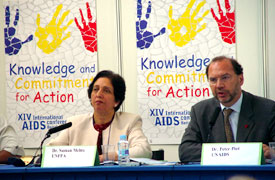Press Release
Step up HIV/AIDS Prevention Efforts that Work, United Nations Population Fund Urges
09 July 2002
Press Release
09 July 2002
BARCELONA—Much more must be done to enable young people and women to protect themselves against HIV infection, Suman Mehta, HIV/AIDS Coordinator for the United Nations Population Fund (UNFPA) said at the XIV International AIDS Conference here.

“We know what to do, but we must do so on a broader scale,” Dr. Mehta said today in a press conference to launch a new report on UNFPA’s support for HIV prevention efforts in developing countries. She was joined by Dr. Peter Piot, Executive Director of UNAIDS, and Benjamin Reletsatsi of the Botswana Family Welfare Association.
Women are physically more vulnerable than men to HIV infection, and poverty and gender discrimination often put them at risk, she stressed. Young people of both sexes suffer from stigma, discrimination, misinformation and denial of access to services. To counter this, she said, “UNFPA supports hundreds of projects in over 100 countries that focus on youth and peer education, and promote gender equality and empowerment of both young men and women to protect themselves.”
As a UNAIDS co-sponsor with a mandate to prevent sexually transmitted infections and promote reproductive health and rights, the UN Population Fund focuses on three aspects of prevention: making sure young people know how to avoid infection and have access to services; helping pregnant women protect against infection; and ensuring that condoms are readily available and are used consistently and correctly.
Dr. Mehta outlined the report, Preventing HIV Infection, Promoting Reproductive Health: UNFPA Response 2002, which describes the Fund’s work in prevention and related areas including prevention of violence against women, support for data collection and analysis, and provision of reproductive health care in emergency situations.
Dr. Piot welcomed the UNFPA report and praised the Fund’s work and its focus on women. “In the countries most affected by AIDS, women are bearing the brunt of the epidemic,” he said. Women need more prevention options other than male condoms to protect their health and save their lives.” He noted that high infection rates for young women in the hardest-hit African countries would have major demographic and social consequences.
Mr. Reletsatsi spoke about prevention efforts among young people in Botswana, where a third of all people over age 15 are HIV positive. His organization works with the African Youth Alliance, a four-country effort to scale-up successful prevention approaches, supported by UNFPA and nongovernmental organization partners with funding from the Bill & Melinda Gates Association.
Other presentations at this weeklong conference have underscored the urgent need to expand such programmes to counter an epidemic that is still in its early stages and growing at an alarming rate in many parts of the world. In Monday’s plenary, Dr. Bernard Schwartzlander, Director of the World Health Organization’s Department of HIV/AIDS, said that 2 million people between 15 and 24 became infected with HIV in 2002—half of all new cases—and that girls’ lack of knowledge about protection was a major reason.
Funding for HIV prevention efforts, as for treatment programmes, is far short of global needs. For instance, at least 8 billion condoms are needed annually for protection against HIV/AIDS in developing countries and Eastern Europe, Population Action International reported last week, but wealthy countries contribute less than 1 billion condoms, fewer than a decade ago.
Dr. Helene Gayle of the Gates Foundation told today’s plenary about a new study by the Global HIV Prevention Group, showing that “only about one in five people at-risk for HIV have access to prevention information and services.” She said a “massive scale-up” of prevention strategies that work could prevent 28 million infections by 2010.
“UNFPA remains commited to support the world’s people and communities to prevent HIV infection and especially to ensure that women and young people are empowered to do so,” Dr. Mehta said at the press conference. “Using effective HIV prevention approaches we can save lives; we can preempt the undue burden on families and communities; we can rebuild economies; we can halt and reverse the epidemic. And, in doing so, ensure our future.”
- - -
UNFPA is the world's largest multilateral source of population assistance, with programmes in 140 countries in 2001. Since it became operational in 1969, the Fund has provided some $5.6 billion to developing countries to meet reproductive health needs and support sustainable development.
Contact Information:
William A. Ryan
Email: ryanw@unfpa.org
Kristin Hetle
Tel.: +1 212-297-5020
Email: hetle@unfpa.org